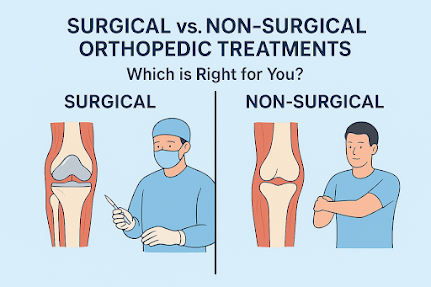When it comes to orthopedic care, patients often wonder whether surgical treatments or non-surgical treatments are the best solution. Choosing the right approach depends on the type of injury, severity of symptoms, and overall health. Understanding the difference helps you make informed decisions about recovery and long-term mobility.
What Are Non-Surgical Orthopedic Treatments?
Non-surgical treatments are the first line of care for many conditions. These include physical therapy, medications, bracing, and lifestyle modifications. For example, joint pain, ligament strain, or mild arthritis often respond well to these methods. Orthopedic doctors recommend these approaches to reduce inflammation, improve flexibility, and strengthen muscles without invasive procedures.
When Do Surgical Treatments Become Necessary?
Surgical treatments are considered when conservative care fails to provide relief. Common procedures include joint replacement, arthroscopy, and fracture fixation. Patients with severe cartilage damage, torn ligaments, or advanced arthritis may benefit more from surgery. An orthopedic surgeon carefully evaluates imaging results and patient history before suggesting an operation.
Benefits of Non-Surgical Approaches
- Faster recovery with minimal downtime
- Lower risk compared to surgery
- Effective for mild to moderate conditions
- Maintains joint health and mobility without major intervention
Non-invasive methods are especially helpful for conditions like back pain, sprains, or repetitive stress injuries. They also suit patients who may not be ideal candidates for surgery due to age or health concerns.
Advantages of Surgical Care
- Provides permanent solutions for chronic conditions
- Restores function in cases of severe joint damage
- Allows patients to return to active lifestyles sooner
- Can address complex fractures and deformities
Surgery ensures stability, alignment, and long-term relief when other treatments fail. With advanced orthopedic procedures and minimally invasive techniques, recovery outcomes have significantly improved.
Which Option Is Right for You?
The choice between orthopedic surgery and non-surgical treatment depends on pain levels, activity goals, and medical evaluations. A personalized treatment plan ensures better results. Consulting an orthopedic specialist helps in determining the best pathway to recovery.
Conclusion
Choosing between surgical and non-surgical orthopedic care is not always simple. Each option has unique benefits, and the right choice depends on your condition, age, and health goals.
Both approaches aim to restore mobility and relieve pain. Always consult an expert orthopedic doctor before deciding on the best treatment for long-term results.
Visit our Khims Hospital for advanced orthopedic care and personalized treatment plans.

